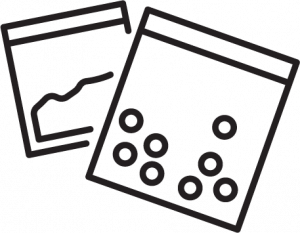New psychoactive substances
The term new psychoactive substances (NPS) refers to a wide range of substances which may not fall under international drug controls. They include synthetic drugs as well as some that are naturally occurring but which have not been commonly seen in recreational drug markets or for which there is little research evidence about their use, effects and harms.
Synthetic drugs have been designed to mimic existing illegal drugs. Their formulations are constantly changing to stay ahead of the law. There is a huge range of substances with different effects and risks. They are unregulated and untested and it is very difficult to know what their common effects are. As they are constantly changing, it is possible to get very different effects from different batches even if they are called the same name.
Evidence from the Illicit Drug Reporting System and Ecstasy and Related Drugs Reporting System suggests that the substances used are constantly changing, however, in 2019 the most commonly used NPS in Australia were DMT (dimethyltryptamine), substances from the 2C class and synthetic cannabis.
Other Names
Street names include synthetic drugs, herbal highs, legal highs, party pills, bath salts,
NBOMES, synthetic cannabis, synthetic cocaine and many others.
DMT
DMT is a hallucinogen which occurs naturally in some plants and animals. It is the active ingredient in ayahuasca, a herbal tea which was used by traditional healers in South America. It may be sold as a crystalline white powder.
Side effects of DMT include:
- Increased heart rate
- Increased blood pressure
- Chest pain or tightness
- Agitation
- Dilated pupils
- Rapid rhythmic eye movements
- Dizziness
- Nausea
- Diarrhoea
At high doses, or in those who are taking anti-depressants DMT can lead to a serious condition called serotonin syndrome which can be fatal and can include:
- Headache
- Loss of muscle control
- Confusion
- Seizures
- Respiratory arrest
- Coma
2C –
The 2C group of drugs is a group of related hallucinogenic substances. The first variation 2C-B was developed for use in psychotherapy and is sometimes used as a substitute for Ecstasy.
There is very little evidence available about the effects and harms of 2C-B and related drugs.
Synthetic Cannabis
Synthetic cannabis (cannabinoids) are synthetic drugs that mimics the effects of cannabis. These are man-made chemicals that have been sprayed on organic material to look like dried herbs. They are generally smoked, or occasionally drunk as tea. ‘Spice’ was the earliest version of synthetic cannabis sold in Australia. Since then a number of products have been developed.
There is limited evidence available about the effects and harms of synthetic cannabis, however, it appears to have similar effects to cannabis plus additional more harmful effects including:
- Fast, irregular heart rate
- Racing thoughts and agitation
- Anxiety and paranoia
- Vomiting
- Aggressive and violent behaviour
- Psychosis
- Chest pain
- Stroke
- Kidney damage
- Seizures
- Stroke and death
Adapted from Drug Facts (New Psychoactive Substances), Alcohol and Drug Foundation, 2019.



